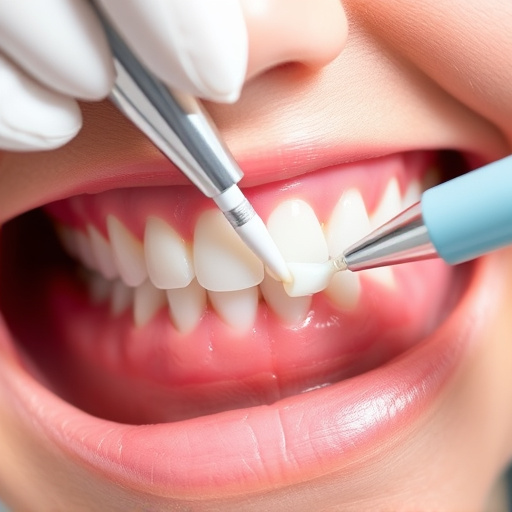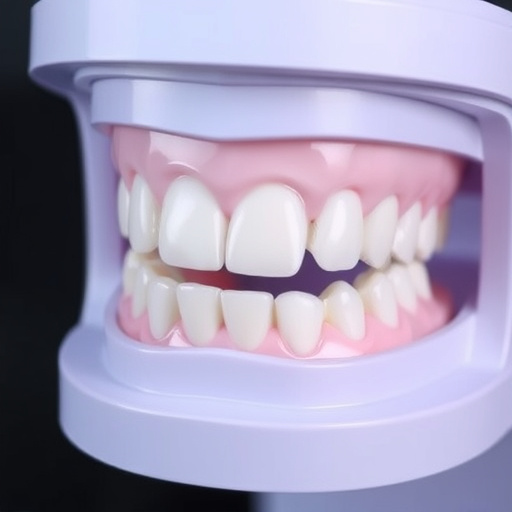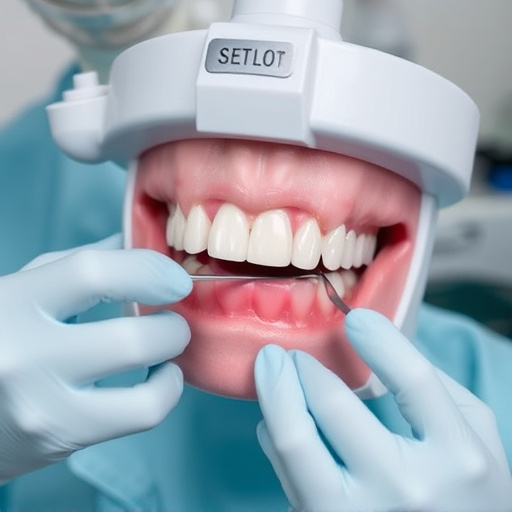Dry mouth (xerostomia) poses significant oral health risks due to reduced saliva production. Fluoride treatment services offer a crucial solution, strengthening tooth enamel and mitigating decay, thereby providing both preventative and symptomatic relief. Recommended during general dentistry visits, these treatments complement regular care, alleviate discomfort, and protect teeth from issues exacerbated by low saliva levels, enhancing overall oral health and aesthetics.
Dry mouth, or xerostomia, can significantly impact oral health due to reduced saliva production. This condition often leads to increased tooth decay and discomfort. Fluoride treatment services offer an ideal solution for patients dealing with dry mouth. By enhancing saliva flow and strengthening tooth enamel, fluoride effectively mitigates the effects of dry mouth. This article explores the understanding and impact of dry mouth, the crucial role of fluoride in its treatment, and the numerous benefits of incorporating fluoride treatment services into oral care routines.
- Understanding Dry Mouth and Its Impact
- The Role of Fluoride in Treating Dry Mouth
- Benefits of Fluoride Treatment Services for Dry Mouth Patients
Understanding Dry Mouth and Its Impact

Dry Mouth, or xerostomia, is a common condition that can significantly impact an individual’s quality of life. It occurs when the salivary glands produce insufficient saliva, leading to a dry mouth and various discomforts. This situation is not merely an inconvenience; it can cause serious dental issues over time. Without adequate saliva, food particles and bacteria remain on the teeth, increasing the risk of tooth decay and gum disease. Patients with Dry Mouth often experience difficulty swallowing, a metallic taste in their mouths, and even increased susceptibility to oral infections.
Fluoride treatment services play a vital role in managing this condition. Fluoride is well-known for its dental benefits, particularly in strengthening enamel and preventing cavities. For individuals with Dry Mouth, regular fluoride applications can help maintain oral health by reducing the risk of tooth erosion and decay. Additionally, these treatments, often coupled with proper dental cleanings and comprehensive dental care, can provide much-needed relief from the symptoms associated with xerostomia, ensuring patients have a healthier, more comfortable oral experience.
The Role of Fluoride in Treating Dry Mouth

Fluoride plays a pivotal role in treating dry mouth by restoring and maintaining optimal oral moisture levels. This mineral helps strengthen tooth enamel, making it more resistant to decay and sensitivity, which are common issues exacerbated by dry mouth. By enhancing the protective layer of the teeth, fluoride treatment services can alleviate discomfort associated with dry mouth, such as soreness, dryness, and increased susceptibility to cavities.
In a comprehensive family dentistry setting, or during general dentistry visits, professionals often recommend fluoride treatments as a proactive measure for patients experiencing dry mouth. Cosmetic fillings, while not directly linked to treating dry mouth, can be used in conjunction with fluoride to address specific dental issues that may arise due to reduced saliva production. Thus, incorporating fluoride treatment services into oral care routines offers a holistic approach, ensuring both the health and aesthetics of one’s smile.
Benefits of Fluoride Treatment Services for Dry Mouth Patients

Fluoride treatment services offer a range of significant benefits for individuals experiencing dry mouth, a condition characterized by an insufficient flow of saliva. This can lead to discomfort, increased risk of tooth decay, and other oral health issues. Fluoride treatments help strengthen tooth enamel, making teeth more resistant to the corrosive effects of bacteria and acids that contribute to tooth erosion and cavities.
Moreover, these services are particularly valuable in the context of children’s dentistry, preventive dentistry, and cosmetic dentistry. For children, regular fluoride treatments can promote healthier teeth development and reduce the need for extensive dental procedures later in life. Preventive dentistry focuses on maintaining oral health through regular check-ups and cleaning, while also incorporating fluoride treatments to ward off potential problems. Cosmetic dentistry aims to enhance a patient’s smile, and fluoride treatments can contribute to achieving that goal by promoting enamel integrity and overall dental aesthetics.
Fluoride treatment services emerge as a comprehensive solution for patients experiencing dry mouth, offering significant benefits in managing symptoms and enhancing overall oral health. By addressing the root causes of this condition, these services provide a lasting effect, ensuring patients can enjoy improved hydration and a healthier mouth. Incorporating fluoride into their routine is a proactive step towards relief and prevention, making it an ideal choice for those seeking long-term benefits.














